Ten practical tips to live in harmony with the environment
EL PAÍS offers some practical advice on how to nurture our planet and better our daily lives
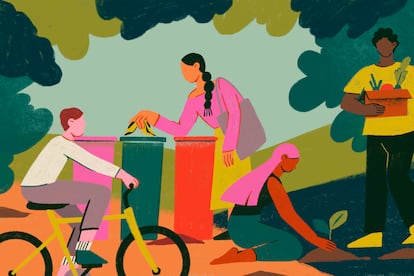
Taking on the challenge of climate change requires a powerful mix of small steps and bold action. While world leaders negotiate ways to combat global warming, governments and businesses make commitments to reduce emissions. As consumers, many of us are unsure how to start adopting more environmentally friendly habits, but we all have a role to play in protecting the planet. Here are 10 little things we can do every day to raise awareness and protect the environment:
1. Separate garbage
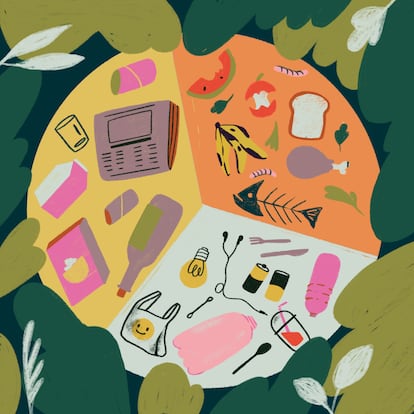
While garbage separation is a voluntary practice for many worldwide or enforced by their governments, it is not mandatory in many Latin American countries. Inadequate waste management contributes to global warming, making it crucial to have three bins at home: one for recyclables, another for compost and a third for disposables.
2. Make compost
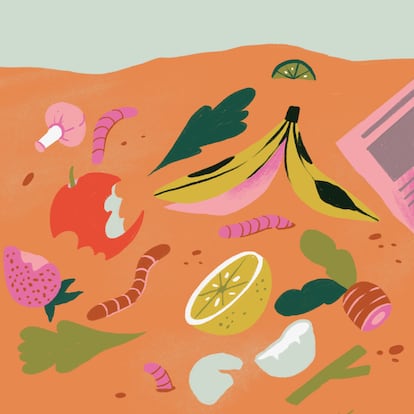
Composting is a natural process for treating daily organic waste. In about three months, we can transform waste into fertile soil. Here’s how to do it:
- To choose the location, think about your living situation. If you live in a house, the compost heap or bin can be placed on the ground outside. If you live in an apartment, you’ll need a composter for your balcony.
- Begin by separating organic plant waste, like fruit and vegetable scraps, and things like tea and coffee grounds. Remember, no meat. Here’s a tip: be mindful of including too much garlic, onion and citrus, as they can make the compost too acidic and take longer to decompose due to their bactericidal effect.
- To create an effective compost system, layer dry waste like soil, grass, cardboard or inkless paper. Maintain moisture balance and ensure proper aeration. Don’t forget to cover it to keep rodents away.
- After filling the composter, allow it to sit and decompose for two to three months. Remember to drain the leachate, those nutrient-rich “juices” produced during organic waste breakdown. When diluted with water, it makes excellent fertilizer.
3. Stop using so much plastic
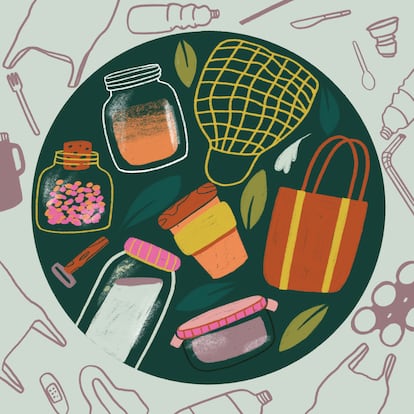
Another piece of advice is to avoid plastics. Every minute, 500 billion plastic bags are used worldwide and often end up polluting ecosystems. There are over 140 million tons of plastic fragments in our oceans. We can two simple things to help out:
- Avoid single-use plastics, which account for 40% of total plastic production and are generally not recycled. Plastic takes between 150 and 500 years to decompose, while its useful lifespan is no more than 30 minutes.
- Say goodbye to packaging. Buy in bulk to reduce the use of plastic bottles, plastic wrap and more.
- For those items we can’t do without, take all the clear plastic bottles and other clear plastic packaging to recycling drop-off points.
4. Reduce energy consumption
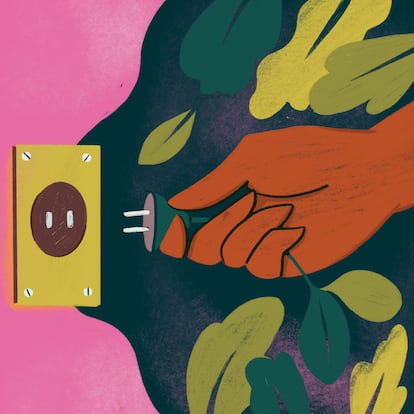
One major challenge we face is the energy transition — shifting from fossil fuels (like oil and gas) to renewable energies (such as solar, wind and hydro). It’s a crucial change that requires reevaluating how we consume energy. Here are some steps we can take:
- Use public transportation instead of traveling by car.
- Reduce electricity consumption.
- Make better use of natural light and replace bulbs with LED lights.
- Watch out for energy vampires, those plugged-in devices that consume electricity even when not in use.
- Find ways to transition to renewable energy sources.
5. Use water responsibly
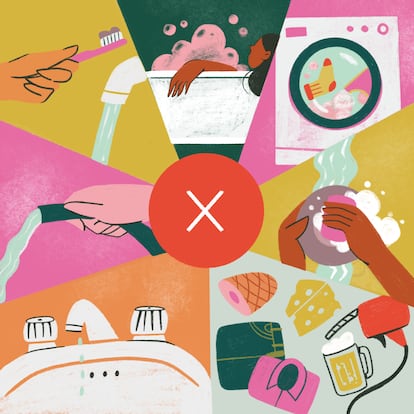
Much like our planet, approximately three-quarters of the human body is made up of water. Water covers 70% of the world’s surface, but only 3% is fresh water suitable for consumption. Out of this 3%, roughly 2% is locked in glaciers and deep underground water tables that are difficult to access. So we only have 1% to supply the 7.7 billion people living on our planet. These statistics clearly highlight the importance of preserving this valuable resource. Here are some concrete actions we can take:
- Don’t brush your teeth with the water running.
- Take showers instead of baths.
- Avoid doing small loads of laundry in the washing machine.
- Don’t let the water run while washing dishes.
- Avoid using a hose to clean exterior surfaces.
- Check for leaky faucets.
- Choose products with lower water footprints (their production processes use the least amount of water possible).
6. Consume locally produced and sustainable foods

Promoting local businesses helps reduce our carbon footprint. Consuming agro-ecological fruits and vegetables supports ventures that use bioinputs instead of agrochemicals and pesticides, and organic seeds instead of genetically modified ones.
7. Use eco-friendly personal care products

Using personal care products that are cruelty-free and do not contain harmful ingredients like parabens is crucial. That’s why many people are switching to eco-friendly options such as solid shampoo, bamboo toothbrushes and natural hair conditioner, deodorant and toothpaste.
For feminine hygiene, some alternatives like menstrual cups, cloth pads and period underwear are available. Disposable sanitary napkins and tampons take 500 years to degrade and contribute to massive amounts of waste.
8. Clean your house with natural products

There are many companies manufacturing solid dishwashing detergents, eco-friendly laundry products and sponges made from plants. Additionally, you can try your hand at homemade degreasers using lemon and baking soda or switch from foam rubber sponges to jute or natural loofah sponges.
9. Reduce paper use
Paper production has significant adverse impacts. The manufacturing, distribution and consumption of paper lead to the overexploitation of natural resources, harming the environment.
What alternatives exist?
- Sugarcane paper is made from bagasse, the residual material left after extracting sugarcane juice. It contains abundant fibers that can be used to produce paper.
- Use recycled paper and avoid printing unless it is essential.
10. Connect with nature
It’s called “earthing” — the act of connecting with nature. For example, walking barefoot outside. How do we do it? Take some time out of our routines to go out and breathe fresh air, walk in a forest, or swim in an ocean or lake.
Besides providing health benefits like stress reduction, improved circulation, better sleep, and nervous system regulation, these activities also help the environment. We will see positive effects in various aspects of our lives, making a difference in our daily routines. We hold the power in our hands.
Bonus tip
Let’s not overlook the urgency of demanding stronger rights and laws, both locally and globally, to safeguard our shared home – the magnificent planet Earth! Big changes have always sprouted from the grassroots. Again, we hold the power in our hands.
Sign up for our weekly newsletter to get more English-language news coverage from EL PAÍS USA Edition
Tu suscripción se está usando en otro dispositivo
¿Quieres añadir otro usuario a tu suscripción?
Si continúas leyendo en este dispositivo, no se podrá leer en el otro.
FlechaTu suscripción se está usando en otro dispositivo y solo puedes acceder a EL PAÍS desde un dispositivo a la vez.
Si quieres compartir tu cuenta, cambia tu suscripción a la modalidad Premium, así podrás añadir otro usuario. Cada uno accederá con su propia cuenta de email, lo que os permitirá personalizar vuestra experiencia en EL PAÍS.
¿Tienes una suscripción de empresa? Accede aquí para contratar más cuentas.
En el caso de no saber quién está usando tu cuenta, te recomendamos cambiar tu contraseña aquí.
Si decides continuar compartiendo tu cuenta, este mensaje se mostrará en tu dispositivo y en el de la otra persona que está usando tu cuenta de forma indefinida, afectando a tu experiencia de lectura. Puedes consultar aquí los términos y condiciones de la suscripción digital.








































